Visual Studio Code (VS Code) remains one of the most popular code editors for developers worldwide in 2025. According tothe Stack Overflow Developer Survey in 2024, 73.6% of developers use VS Code, while its nearest alternative, Visual Studio, is used by only about 30% of developers. It's free, incredibly fast, and strikes the perfect balance between being lightweight and feature-rich.
But what really makes VS Code powerful are its extensions.VS Marketplace offers over 60,000 extensions for deep customization. With these extensions, developers can adjust their coding environment to suit their specific needs and significantly boost IDE productivity.
In this blog, we'll shortlist the top 10 VS Code extensions you need in 2025—grouped by purpose and selected for real impact on productivity, code quality, and collaboration. Whether you’re a solo developer or part of a remote team, these tools can help transform your workflow, eliminate distractions, and supercharge your coding experience.
What is VS Code?
VS Code (Visual Studio Code) is a free, open-source code editor from Microsoft that works on Windows, Mac, and Linux. Its extreme popularity is attributed to the fact that it comes packed with great features like built-in Git support for managing the code, a powerful debugger, and an integrated terminal so developers can run commands without leaving the editor. It also offers IntelliSense, which suggests code completions and highlights errors as developers type. VS Code supports almost every major programming language like JavaScript, Python, Java, C#, and TypeScript—and it is possible to add support for others like COBOL through extensions.
What are VSCode Extensions?
Our Picks of the Top 10 VS Code Extensions You Need in 2025:
GitLens - Best for Tracking Code Changes
Publisher: GitKraken
41,729,804 installs
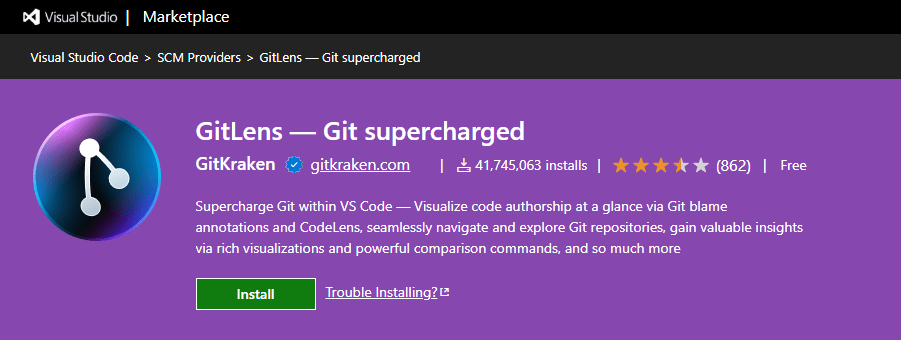
GitLens is a powerful plugin for analyzing and visualizing all code changes from the Git version control system right in the VS Code editor. GitLens makes it easier to study and determine who and when made specific commits, changes, and even compare branches. It adds subtle blame annotations at the end of each line, showing who last modified the code and why, offering context that is especially valuable when working with unfamiliar codebases. GitLens also includes visual branch representations for easier navigation and stash management tools to support quick context switching.
Why You Need It: GitLens turbocharges your Git experience within VSCode, offering deep insights into code history and authorship.
Key Features:
- Inline blame annotations to see who changed what and when
- Commit graphs for visualizing repository history
- Seamless integration with GitHub, GitLab, and Bitbucket for pull requests and issues
- Side-by-side enhanced diff views for comparing changes
- Powerful filtering options to find commits by author, message, or file
Use Case: Perfect for teams collaborating on large projects or solo developers tracking their own contributions.
ESLint - Best for Coding Consistency & Quality
Publisher: Microsoft
43,490,638 installs
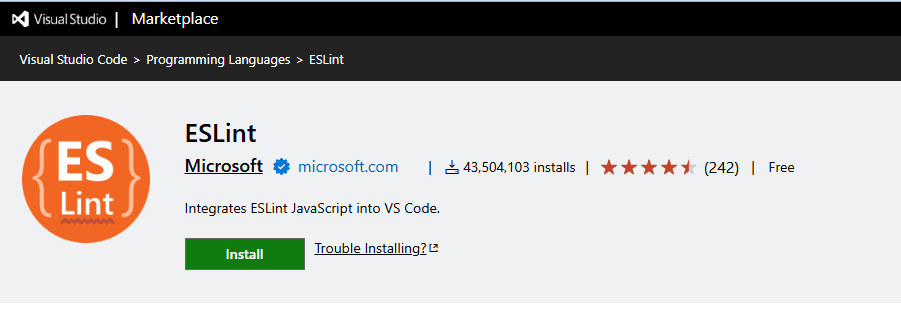
ESLint is a powerful static code analysis tool that identifies and fixes problems in your code. It supports both JavaScript and TypeScript languages and helps maintain consistent code quality by enforcing consistent writing styles and catching potential errors and bugs early in the development process. A set of rules it follows can be modified if necessary, to better suit your specific needs. It is useful for both developers and companies with their own coding standards.
Why You Need It: ESLint keeps your JavaScript and TypeScript code clean by identifying and fixing potential issues.
Key Features:
- Real-time linting within the editor for catching errors and enforcing coding standards
- Allows for customizable ESLint configurations and rules for team-specific guidelines
- Auto-fix for common issues like spacing and semicolons
- Integrates with popular JavaScript frameworks like React, Vue, and Node.js
- Works with TypeScript and other transpiled languages
Use Case: Critical for frontend and Node.js developers aiming for high-quality code.
Prettier - Best for Code Formatting
Publisher: Prettier (community-driven, led by the Prettier team)
57,922,336 installs
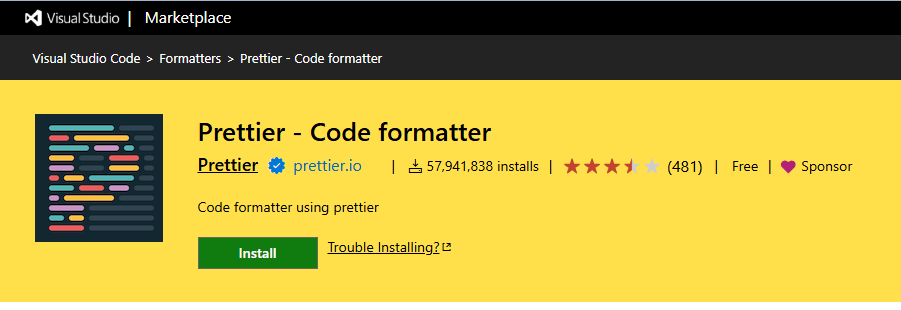
Prettier is a code formatter that ensures that your code is consistently formatted across your entire codebase, improving code readability and maintainability. One of the most popular VS Code extensions. Prettier supports many programming languages such as JavaScript, TypeScript, CSS, HTML, and JSON and can be customized to suit the style of your project. Using Prettier in combination with ESLint offers maximum effectiveness and IDE productivity.
Why You Need It: Prettier ensures consistent code formatting across your projects, saving time and reducing style debates.
Key Features:
- Automatic code formatting for JavaScript, TypeScript, CSS, HTML, and more
- Configurable rules to match the same styles across your development team
- Integration with ESLint for linting and formatting synergy
- Format-on-save for automatically formatting the code code every time you save a file
Use Case: Ideal for maintaining clean, readable codebases, especially in multi-developer environments.
Live Server - Best for real-time web development
Publisher: Ritwick Dey (individual developer)
64,501,668 installs
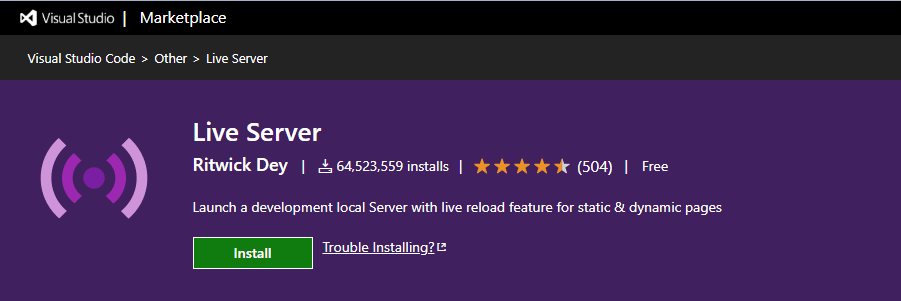
Live Server is a must-use extension if you don't want to click "refresh" every time you change your code. This extension enables developers to avoid the need to constantly save work in the editor and then reload the browser to view changes. Live Server makes it possible to instantly see changes during coding by automatically refreshing the browser when any code changes are introduced - no manual refresh is needed.
Why You Need It: Live Server provides a real-time development server with live reload, perfect for web developers.
Key Features:
- Easy launch and stop of the server with a single click from the status bar
- Instant browser refresh on file changes
- Support for HTML, CSS, and JavaScript projects
- HTTPS support for secure testing
- Customizable port numbers, browser options, or root folders to match your project needs.
Use Case: Speeds up frontend development by eliminating manual browser refreshes.
GitHub Copilot - Best for AI Coding Assistance using natural language
Publisher: GitHub (owned by Microsoft)
39,759,321 installs
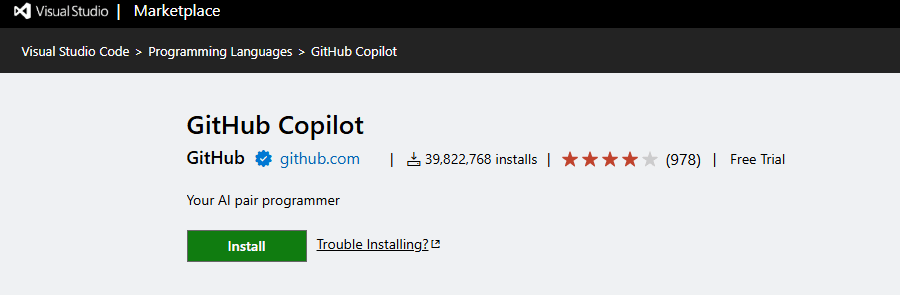
Live Server is a must-use extension if you don't want to click "refresh" every time you change your code. This extension enables developers to avoid the need to constantly save work in the editor and then reload the browser to view changes. Live Server makes it possible to instantly see changes during coding by automatically refreshing the browser when any code changes are introduced - no manual refresh is needed.
Why You Need It: Live Server provides a real-time development server with live reload, perfect for web developers.
Key Features:
- Easy launch and stop of the server with a single click from the status bar
- Instant browser refresh on file changes
- Support for HTML, CSS, and JavaScript projects
- HTTPS support for secure testing
- Customizable port numbers, browser options, or root folders to match your project needs.
Use Case: Speeds up frontend development by eliminating manual browser refreshes.
GitHub Copilot - Best for AI Coding Assistance using natural language
Publisher: GitHub (owned by Microsoft)
39,759,321 installs
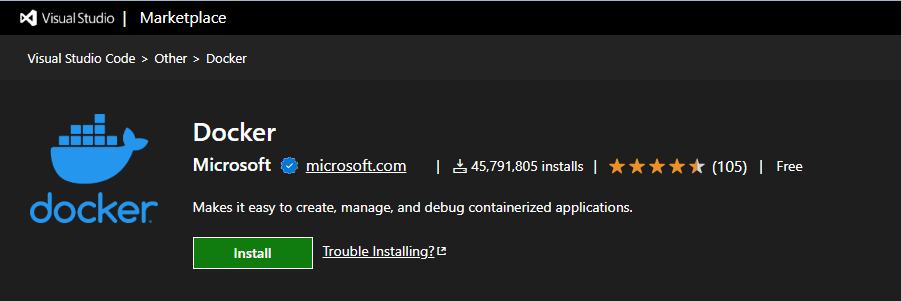
Containers continue to dominate software deployment. For developers working with containers, Docker extension adds support for Dockerfiles, docker-compose files, and provides tools for managing Docker containers right in VS Code. It provides useful commands, syntax highlighting for Dockerfiles, and integration with Docker Compose, streamlining container workflows.
Why You Need It: The Docker extension simplifies container management, making it a must-have for modern DevOps workflows.
Key Features:
- Manage Docker containers, images, and networks directly in VSCode
- Syntax highlighting and autocompletion for Dockerfiles
- Integration with Docker Compose for multi-container apps
- One-click debugging for Node.js, Python, and .NET Core inside containers
Use Case: Essential for developers building and deploying containerized apps.
Live Share- Bet for Real Time Collaboration & Pair Programming
Publisher: Microsoft
20,823,451 installs
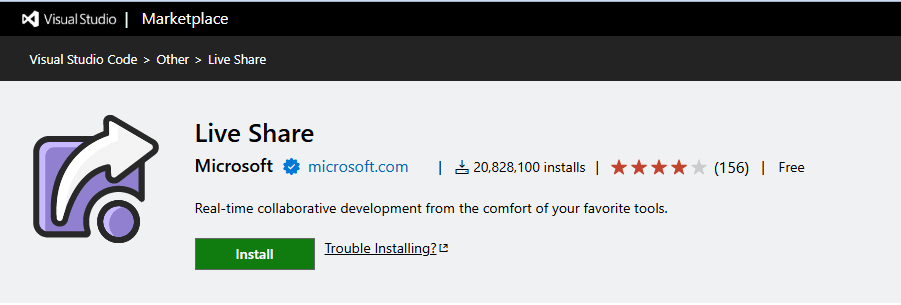
Remote collaboration is more important than ever. Live Share enables developers to collaborate with others in real time by sharing their VS Code environment without the need to clone the repo or install dependencies. It is a great solution for collaborative programming, code reviews, or debugging sessions without leaving VSCode. Live Share also includes built-in chat, audio calls, and integrates with Microsoft Teams. Perfect for distributed teams.
Why You Need It: Live Share turns VS Code into a powerful collaborative platform that keeps teams connected and productive, regardless of physical location.
Key Features:
- Secure session sharing with access controls (e.g., read-only or edit permissions)
- Real-time collaborative editing, debugging, and terminal sharing across VS Code instances
- Retain IDE preferences while pair programming
- Supports audio chat, presence indicators, and cursor tracking for team members
Use Case: Ideal for distributed teams, code reviews, or mentoring, enhancing remote workflows in 2025.
Project Manager - Best for Managing Multiple Projects
Publisher: Alessandro Fragnani (individual developer)
6,242,439 installs

Project Manager is a valuable extension that helps developers organize and switch between different projects with ease. Instead of manually opening folders or recent files, with this extension, it becomes possible to save projects and access them from a handy side menu or command palette. It's a time-saver if you are juggling multiple clients, codebases, or repositories simultaneously, helping you stay focused on coding.
Why You Need It: It streamlines your workflow by letting you manage and quickly switch between projects without digging through folders.
Key Features:
- Save and label projects with custom names and tags
- Access projects via the sidebar or command palette
- Mark most used projects as favorites for the fastest access
- Keep separate configurations for each project, excluding configuration conflicts
Use Case: Ideal for developers working on several projects, especially across different clients or teams.
Thunder Client – Best for API testing
Publisher: Ranga Vadhineni (individual developer)
5,619,056 installs
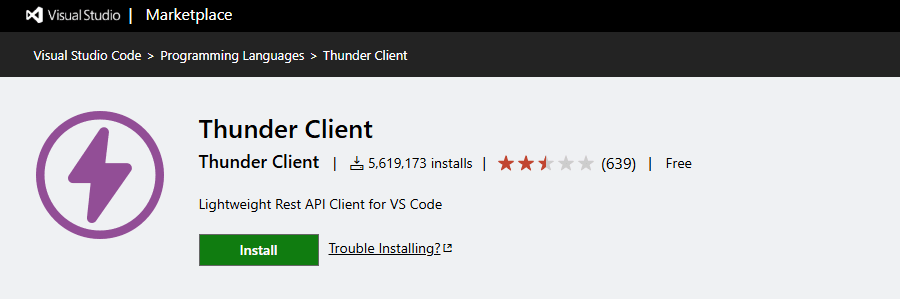
Thunder Client is a lightweight, Postman-like REST client built directly into VS Code. It's gaining traction in 2025 for its simplicity and native IDE feel. It lets developers send HTTP requests, test APIs, and view responses without switching tools. With support for collections, environments, and auth methods, it's perfect for frontend or full-stack developers who want a simple, visual way to work with APIs.
Why You Need It: Test REST APIs quickly with a visual UI without the need to leave the VS Code editor.
Key Features:
- Clean and fast Postman-style interface
- Save and organize requests in collections, with history and environment variables for reuse
- Scriptless testing with support for GraphQL and WebSocket.
- CLI support for CI/CD pipelines
Use Case: Frontend, backend, and full-stack devs who work with APIs regularly and need quick, reliable API testing inside their IDE.
Code Runner - Best for quick code execution
Publisher: Jun Han (individual developer)
34,143,971 installs
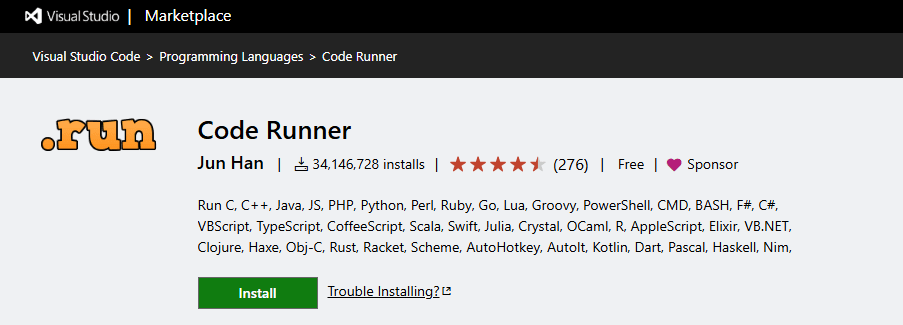
Code Runner is a versatile VS Code extension that allows executing code snippets or entire files with a single click without leaving the VS Code editor. This extension supports various programming languages, including Python, JS, Java, C++, Go, and more, which makes it a universal tool for rapid prototyping and testing. It's especially useful for testing small pieces of code or learning new languages.
Why You Need It: Code Runner lets you execute code snippets in multiple languages directly in VSCode, streamlining prototyping.
Key Features:
- Support numerous programming languages, like Python, JavaScript, C++, Java, and more.
- Run selected code or entire files with a single click
- Customizable for how each language is executed in the settings
- Output is displayed in the integrated terminal or the output window
Use Case: Great for quick testing, experimenting, and learning new languages.
Bottom Line
VSCode's extensibility is what makes it a developer favorite in 2025. Whether you're coding AI models, building web apps, or managing infrastructure, there are extensions that can streamline your work and improve your coding experience. In this post, we covered 10 popular VS Code extensions that serve a wide audience and high installation counts. However, it’s important to remember that not every extension will suit every developer. Pick those that match your primary development tasks. When selecting extensions, look for those that integrate seamlessly into your existing workflows, offer customization options, focus on developer usability, and include reliable support in case of facing any problems. With the right extensions, you can boost your productivity, reduce context switching, and make your IDE feel like a tool built just for you.